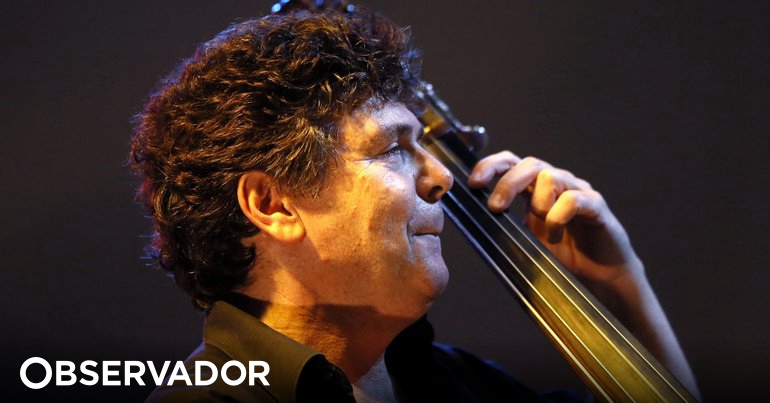Carlos Bica's new album, “11:11”, brings together the veteran Berlin-based bassist with three new Portuguese musicians, with whom he revisits José Mário Branco's “A Noite”, among the original songs, in a disturbing context for democracy.
“It is essential that human beings live in a democracy and we should be worried if they want to steal democracy from us, but instead of dying like crazy heroes, we must above all contribute to a better world with the best we have to offer,” Carlos Pica said in an interview with Lusa.
“11:11” was recorded with new traveling companions, as the composer and double bass player forms his new quartet: José Soares, on alto saxophone, Eduardo Cardenio, on vibraphone, and Gonzalo Neto, on guitar and banjo, who also composed two of the “11:11” themes recorded, in addition to Beca joining in writing a third theme.
Despite living in Berlin for 40 years, he has never lost touch with the Portuguese music scene, as the composer of Lusa's “Azul” confirms. That's why he ended up bringing together “some of the most talented and creative musicians of the new generation”.
The title of “11:11” comes from a coincidence that became a constant in his life, which he later sought to understand and which gave him “a gateway to the universe”. On the other hand, the voice of José Mário Branco (1944-2019) was a project that he had the authorization of the composer for: a reinterpretation of the song “A Noite”, built from three “modern lyric poems” by Antero de Quintal, the 19th-century poet who appealed to the humiliated: “Do not quarrel over the crumbs of the feast.” […]Take your place at the table!
“José Mário Branco lived through a very difficult period in the history of Portugal,” recalls Carlos Bica. “When he was only 21, he was forced into exile in Paris to escape the colonial war, and he only returned in 1974, after the Carnation Revolution. José Mário’s music is synonymous with all his experiences. The word served the music, but the music also served the word, in addition to the wonderful songs he composed.
Preparing for “11:11” reminded Carlos Pica of “teenage and garage band times” where he would spend “hours playing a song without ever looking at the clock.”
“The joy of discovery and surprise is a very strong feeling that unites us when making music and where age difference is absolutely irrelevant,” he told Lusa. “The countless hours shared in the rehearsal room are essential to achieving a collective sound, and it is this quality that makes the difference.”
With four decades of life in Germany and a name firmly established at the top of the jazz scene, whether in the trio he maintained with guitarist Frank Mobus, or in working with musicians such as John Zorn, Ray Anderson or Aki Takase, Carlos Bica has always had many projects born in collaboration with Portuguese musicians, from the group Cal Viva, with guitarist José Peixoto, to the program “Dez” with singer and actress Ana Brandão, without forgetting the long partnerships with singer Maria João and pianist João Paulo Esteves da Silva.
“For this new quartet, several steps were taken to arrive at this constellation,” he told Lusa. “Despite the geographical distance between Berlin and Lisbon, the musicians in my new quartet appeared as if by chance. The generation gap is an added value to this project,” in which everything seems to have come about naturally, “without much effort,” as happens with “the good things in life,” “even though we are aware that previous work is necessary for it to happen to them.”
The album “11:11” is available on digital platforms, but it also has a disc version. “Fortunately, there are still many music lovers who like to hold physical objects in their hands,” Carlos Pica told Lusa. “CD sales [na globalidade] It has fallen dramatically. There are few or no stores, and purchases can only be made by ordering directly from publishers or purchasing from concert venues.
“Vinyl, once thought to be a disappearing audio medium, is regaining its popularity from year to year, not only because of the difference in sound quality, but above all because of the physical body itself,” he recalls.
“I would like to take this opportunity to pay a great tribute to the Portuguese publisher Clean Feed, which publishes “11:11”. “For 23 years of its existence without any external help and with a lot of work and passion, it has been releasing albums of excellent quality, recordings that would not have existed otherwise and whose existence is of great importance for both musicians and the public.”
Carlos Pica told Lusa that the presentation of “11:11” will take place on October 16, in the Rectorate Hall of the University of Nova de Lisboa, the same hall where last year he presented the previous work “Playing with Beethoven”. At the Cause and Effect Festival, with saxophonist Daniel Erdmann, accordionist João Barradas and DJ Elfebe.

“Coffee trailblazer. Social media ninja. Unapologetic web guru. Friendly music fan. Alcohol fanatic.”

